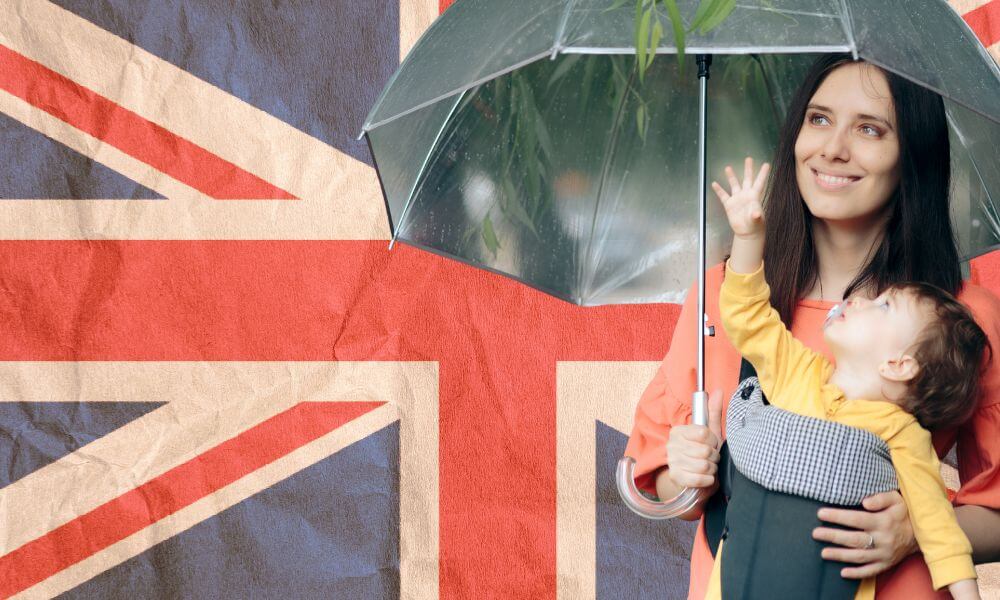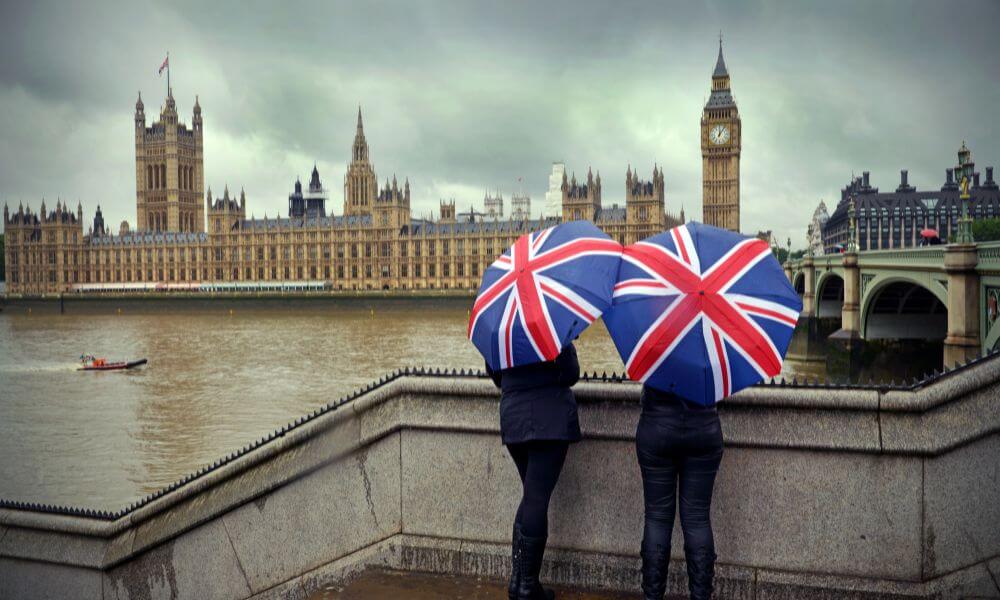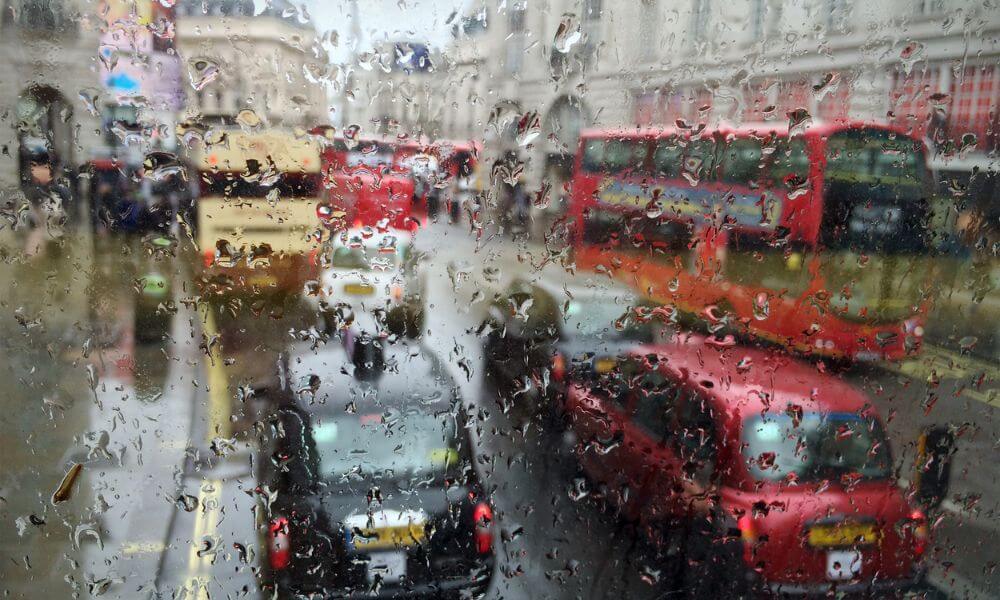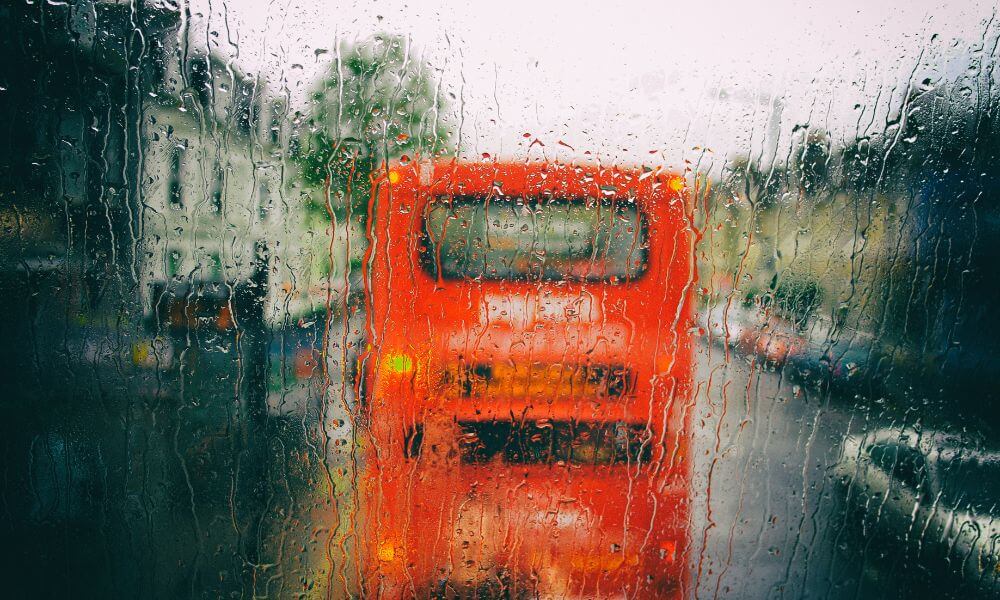It is almost certainly the greatest cliché about Britain that it rains constantly, and the greatest cliché about the British people than that they love nothing more than to complain about it.
It will come as a surprise to no one, then, that the British have a great number of different slang terms for rain and rainy weather.
From the most common, clear and well known to the more esoteric and archaic, all manner of colorful metaphors are employed to talk about the rain in Britain.
Let’s look at a selection of these terms.

Drizzle

Firstly we have drizzle, one of the most commonly used slang terms for rain in Britain.
This slang describes a kind of light rain, when it’s coming down constantly but only lightly.
This one isn’t only used in Britain but you can be sure it is most commonly used in Britain.
“There’s a bit of a drizzle out there today,” for example.
It seems to be a fairly old word in terms of its origin.
Though it’s not completely certain, it’s thought to derive from the Old English dreosan, which meant “to fall”.
This was possibly combined with the word “dreary”, relating to the rain, and thus by the 16th Century it had come to mean light rain.
Mizzle
Very similar to the word drizzle is mizzle, another word that essentially describes the same thing.
This word, like drizzle, can be both a verb and a noun.
You might say there’s a light mizzle outside, or you might equally say that it is “mizzling” outside.
This one is less common than its counterpart drizzle, but still very common and widely understood. “I need to get out before the mizzle starts again,” for example.
Despite its similarity to drizzle, this one seems to come from an entirely different root.
In late Middle English, “mizzle” meant mist, and so it probably arose as a frequentative from that base in the late Medieval period.
Dribble

Next we have dribble, which is another way of saying that it is raining lightly.
You no doubt recognize this word relating to the way people or animals dribble or drool, so you’ve already nailed the sense of this word.
This one is a bit less common but given the word itself, intuitively understood.
When it’s just barely coming down, or hinting at more rain later, it’s dribbling.
When it first started being used as a word for rain is not really clear, but the word dribble dates back to at least the middle of the 16th Century.
It arose out of the word drip, though the original sense of the word was to shoot an arrow wide or short of the target.
It was about how it fell limp before reaching its destination, like a dribble of rain.
Spitting
Spitting is among the most common of all British slang terms for rain.
This one is universally used across all parts of Britain, and you’ll hear it everywhere.
Indeed, spitting is such a common activity with rain in Britain that you’re unlikely to visit the country and not hear someone use the term.
Again, spitting is light rain, although perhaps a bit stronger than a drizzle or a dribble.
“Put a coat on, it’s spitting out there,” for example.
Again, due to the ubiquity of this term, it’s very hard to say with any certainty when it was first used to mean raining.
The word itself is once again very old in origin.
The Old English spittan meant to expel saliva, so it has come down to us all but unchanged over all these centuries.
Shower

“Shower” is another way to talk about rainy weather in British slang.
This one is again very widely used and perhaps skirts the edges of being true slang.
You might even hear this one in weather reports on the news.
A shower is generally a reasonably intense bout of rain over a shorter period.
“We can expect showers all day tomorrow,” for example.
The original term was “rainshower”, which also developed out of an Old English term, regnscur.
This had further roots in Proto-Germanic, but the sense is clear: the Anglo-Saxons didn’t have showers, of course, so that’s where we get the term shower from—rather than the other way around.
Chucking it down
Having armed you with more than a few ways of saying the rain is mild, now let’s look at ways of describing more intense rain.
One of the most common of these is to say that it is “chucking it down”. “Chucking” or to “chuck” is a common British slang verb meaning to throw.
When it is “chucking it down,” then, it’s raining very heavily and being thrown down from the sky. “It’s absolutely chucking it down, I’m not going out today,” for example.
The word “chuck” probably derives from the Old French chequer, meaning to knock or hit.
When exactly this phrase came into use, though, is not clear—it may be very old but it has become a great deal more common over the course of the last century or so.
Bucketing it down
Another variant of the above expression is to say it is “bucketing it down”. This one should be quite clear in its meaning.
When it is raining very heavily, it is bucketing it down as if buckets of rain are being thrown from the sky.
This one is not quite as common as others like chucking it down, but nonetheless one you’ll certainly hear a lot.
Again, we can trace the origin of the word bucket, but we can’t say for sure when this phrase came into use.
Bucket probably derives ultimately from the Old English buc, meaning belly or pitcher.
From Anglo-Norman French, we got the term buquet meaning tub or pail.
Eventually, “bucketing” came to mean heavy rain.
Pi**ing it down
Another, less socially acceptable way to say that it’s raining heavily is to say it is “pi**ing it down”.
Of course you want to be very careful when and where you use this one, but it is nonetheless among the most common ways of saying it is raining very heavily. “Get the washing in, it’s pi**ing it down,” for example.
This is another case where we can trace the words involved, but not the phrase as a whole.
To “pi**” ultimately derives from Vulgar Latin pissio, through Old French and Middle English ultimately becoming the modern word.
Beating down
“Beating down” is another very common way of saying that it is raining very heavily.
There are a variety of ways you can use the phrase “beating down” or “beat down”.
Indeed, the sun itself can “beat down” on you on a hot day. It might be a physical “beat down” involving a fight.
The rain can of course also beat down, or it can be “beating down” with rain.
Once again it’s very difficult to say when a phrase like this could have arisen.
It seems a perfectly natural way to describe heavy rain in the confines of the English language.
It is probably very old, then, and may be as old again as the Old English period.
Raining cats and dogs
This one is another quintessentially British expression, one that you will again certainly hear if you’re in Britain when it’s raining heavily.
To say it’s raining cats and dogs is to say it’s raining very heavily—indeed, for some people, this is reserved only for the most intense deluge of rain.
Others might use it more casually, but it always means intense rain. “It’s raining cats and dogs, we’d best get back home,” for example.
It’s not completely clear where this expression comes from.
One theory posits it derives from the fact that dead animals would be disgorged from drainage systems in the 17th Century after heavy rain.
Others think it was a corruption of the Greek katadoupoi, meaning a waterfall on the Nile.
In Norse mythology, dogs were seen with the god of storms, Odin, and cats with witches—both of which flew through the sky like rain.
We will never know for sure, but there many tantalizing possibilities.
Teeming
Next we have teeming or teeming with rain.
Obviously, the word “teeming” is a very common expression in English meaning to be full of something or swarming with it.
Eventually, heavy rain came to be described as “teeming” as the sky and streets were full of rain.
It’s far from the most common on this list, but definitely one that is widely used and understood throughout Britain.
“I can’t believe the weather today—it’s teeming with rain,” for example.
The word teem derives from Old English, where teman related to the word “team”.
That is, a large group of things.
This sense also included “give birth” or “become pregnant”, which in the 16th Century gave rise to the modern sense of being full of something.
Heavens opened
Another very common expression in Britain for when it rains heavily is to say the “heavens opened”.
The sense is reasonably clear—the heavens being the skies, and the opening referring to almost like a floodgate opening to allow the rain through.
This is very common but used more among the older generations.
“We were waiting for a cab when suddenly the heavens just opened,” for example.
The word heaven derives from the Old English heofon which meant home of god, but beyond that it’s not clear when this particular phrase came into use.
Again, it may well be extremely old given the religious connotations, but it’s hard to say as we have no records of its first use.
Ache and pain
Here we have an example of Cockney rhyming slang.
Naturally, this one is much more regional than the others we’ve looked at so far.
You won’t hear this one used outside of London, indeed exclusively the East End of London. It’s just as simple as it sounds—rhyming slang substitutes a rhyming word for the word you want to say.
Thus “rain” becomes “ache and pain”. “I’ll have to go out in the ache and pain,” for example.
It’s hard to say, again, when most examples of rhyming slang started being used.
They’re entirely vernacular and rarely written down, so there’s really no way to say with any precision.
It may have been in the last couple of centuries, but beyond that it’s hard to say.
Duke of Spain
Another example of rhyming slang for rain is “duke of Spain”.
Again, it’s the simple fact that this rhymes with rain—that’s all there is to it!
It could be used both for intense rain but also milder showers.
Kelsher
This is among the rarer slang terms on this list, but some places in England you may hear people refer to heavy rainfall as a “kelsher”.
Again this is far from common and limited to very specific parts of England, and even there it is somewhat archaic.
Nonetheless, it’s one that’s still used to mean a heavy fall of rain.
“There’s a kelsher coming, I think,” for example.
We really are completely clueless of the origin of this one.
There are neither etymological clues in the word itself nor historical clues in past uses of it.
We just don’t know.
Smirr
Smirr is another less common one, for a light rainfall which falls over the world like a thin mist.
This one is used pretty much exclusively in Scotland.
It describes very light rain, but that specific kind of fine rain which soaks through all your clothes and penetrates to your skin.
It’s rather like “sleet” of snow.
“There’s a fine smirr out there today,” for example.
It seems to be an old one with similar words attested from the early 19th Century.
Where exactly it derives from, though, is not clear.
Nice weather for ducks
Finally, we have a bit of dry British humor.
Some witty folks might choose to say that, when it’s raining, it’s “nice weather for ducks”.
The sense is quite clear—ducks are waterfowl and naturally love the rain when it happens.
At least, that’s what we would expect.
In fact, the phrase is derived from hunting, where ducks cannot hear you properly if it’s raining.
This could be used for any degree or intensity of rain, from the heaviest to the lightest. “It’s certainly nice weather today. For ducks,” for example.
British slang is almost always very varied in just about any area, but it really excels when it comes to rain.
This is due to more than just the fact that it always rains in Britain—it’s also a testament to the linguistic creativity of the British people!
If you’re in need of a way to say that it’s raining heavily, just a bit or anything in between, then one of the terms on this list will have you covered.
More in British Slang
- British Slang For Alcohol
- British Slang For Angry
- British Slang For Argument
- British Slang For Bad
- British Slang For Boss
- British Slang For Boy
- British Slang For Breasts
- British Slang For Butt
- British Slang For Car
- British Slang For Cat
- British Slang For Child
- British Slang For Cigarette
- British Slang For Coffee
- British Slang For Cold
- British Slang For Cool
- British Slang For Delicious
- British Slang For Diarrhea
- British Slang For Dog
- British Slang For Drunk
- British Slang For Easy
- British Slang For Expensive
- British Slang For Eyes
- British Slang For Face
- British Slang For Fat Person
- British Slang For Fist Fight
- British Slang For Flatulence
- British Slang For Food
- British Slang For Friend
- British Slang For Girl
- British Slang For Glasses
- British Slang For Going To Bed
- British Slang For Good
- British Slang For Good Luck
- British Slang For Goodbye
- British Slang For Gossip
- British Slang For Grandmother
- British Slang For Gun
- British Slang For Hair
- British Slang For Happy
- British Slang For Head
- British Slang For Helicopter
- British Slang For Hello
- British Slang For Horny
- British Slang For House
- British Slang For Hungry
- British Slang For Hurry Up
- British Slang For Husband
- British Slang For Idiot
- British Slang For Jail
- British Slang For Jerk
- British Slang For Job
- British Slang For Kiss
- British Slang For Knife
- British Slang For Loser
- British Slang For Lover
- British Slang For Lying
- British Slang For Menstruation
- British Slang For Money
- British Slang For Motorcycle
- British Slang For Mouth
- British Slang For No
- British Slang For Nonsense
- British Slang For Nose
- British Slang For Pajamas
- British Slang For Party
- British Slang For Police
- British Slang For Poor
- British Slang For Potato
- British Slang For Pregnant
- British Slang For Rain
- British Slang For Relax
- British Slang For Rich
- British Slang For Sailor
- British Slang For Sandwich
- British Slang For Scared
- British Slang For Sexy
- British Slang For Shoes
- British Slang For Silly
- British Slang For Soldier
- British Slang For Stomach
- British Slang For Surprised
- British Slang For Tea
- British Slang For Teeth
- British Slang For Telephone
- British Slang For Television
- British Slang For Testicles
- British Slang For Thank You
- British Slang For Thief
- British Slang For Tired
- British Slang For Toilet
- British Slang For Umbrella
- British Slang For Vacation
- British Slang For Vomit
- British Slang For Walking
- British Slang For Weird
- British Slang For Wife
- British Slang For Wonderful
- British Slang For Work
- British Slang For Yes
- British Slang Insults
- British Slang Quiz

